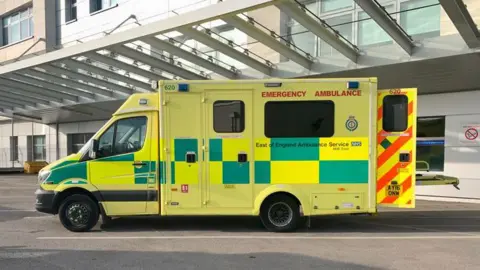Ambulance service declares highest alert level
 Getty Images
Getty ImagesThe East of England Ambulance Service NHS Trust (EEAST) has declared its highest alert level due to mounting winter pressure.
EEAST said it had seen an "unprecedented level" of calls and increased pressures at hospitals across the region, leading to longer handover times.
A spokesperson also said it anticipated an increase in demand because of cold weather and the new year's celebrations.
EEAST medical director Simon Walsh said crews were "stretched to the limit" and urged people to think carefully before calling 999.
The service warned patients they could face longer than normal waits for an ambulance and encouraged people to make their own way to hospital where possible.
Mr Walsh said: "There is an outstanding level of pressure on the whole health system in the East of England.
"We have seen a huge spike in demand, driven by an increase in respiratory illness, which means many of our hospitals are at capacity and our ambulance crews are stretched to the limit."
He said where possible, people should try to see their GP, use 111 or take themselves to hospital unless experiencing a medical emergency.
"During periods of high demand for our services, patients with urgent and immediately life-threatening conditions are our priority.
"Those with less serious conditions will be advised that there may be a delayed response or, if it is safe to do so, they should seek alternative care.
"We apologise in advance to anyone experiencing delays."
Speaking to BBC Radio Cambridgeshire, Mr Walsh stressed he wanted to reassure everyone that "we will get to people who have life-threatening emergencies".
But he said over the last two days, there had been delays of more than 12 hours for patients being handed over from the ambulances to the hospitals.
Mr Walsh said the raised alert level meant the service had "increased our staffing and put every possible clinician available to go out either on an ambulance or working in the control room".
Follow East of England news on X, Instagram and Facebook: BBC Beds, Herts & Bucks, BBC Cambridgeshire, BBC Essex, BBC Norfolk, BBC Northamptonshire or BBC Suffolk.
